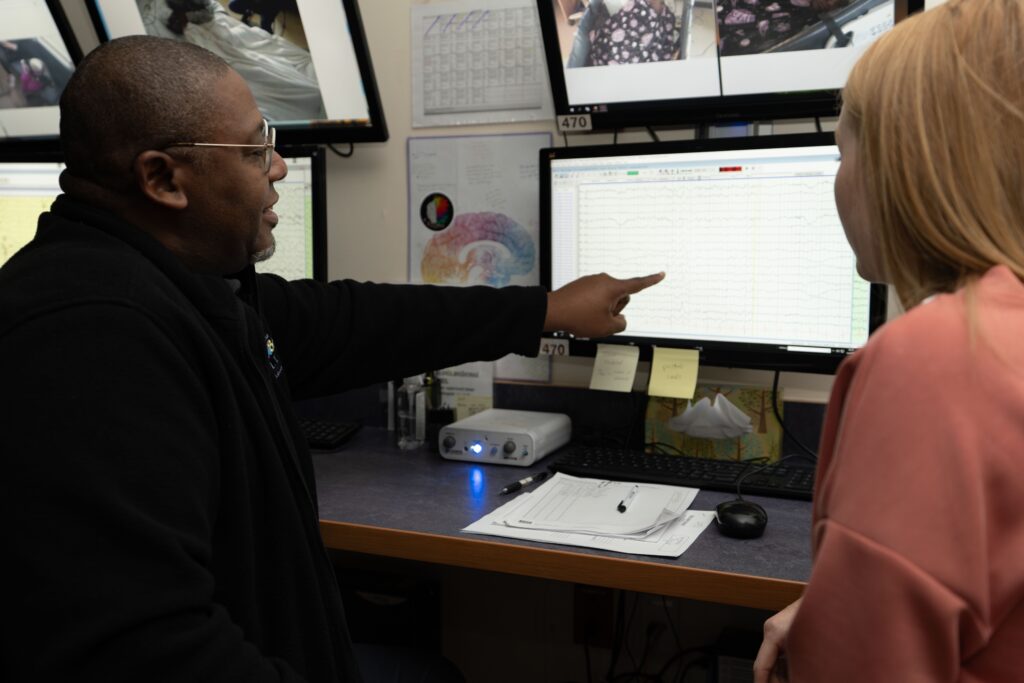Watch this video about our philosophy of graduate medical education at Dell Medical School.

Child Neurology Residency
Resident education is an important part of our pediatric neuroscience program. Each faculty neurologist has designated time for resident teaching. The faculty members oversee inpatient and outpatient rotations for UT medical students as well as residents in child and adult neurology, pediatrics, and psychiatry. Pediatric neuroscience faculty members are readily available for individual discussions, didactic presentations, and collaboration with resident research projects.
In addition to the customary inpatient and outpatient clinical rotations and elective blocks, residents participate in an array of didactic and small group teaching sessions. These include weekly Neurology Department Grand Rounds (Tuesday mornings), a weekly Wednesday child neurology conference, Pediatric Department Grand Rounds (Friday mornings), a weekly epilepsy conference, neurology residents’ morning report (a thrice-weekly, patient-based session with both adult and pediatric patients), and weekly neurology and neuroscience lectures with the adult neurology residents.
We believe that exhausted residents do not learn well, so we limit our child neurology residents to an average of one-in-four night call and one-in-four weekend coverage. Night call is from home, and we allow trainees to leave early that day if night call has been busy. Child neurology residents are responsible only for pediatric neurology night and weekend call duties.
We encourage each resident to complete one or more scholarly projects during their residency with the help of a faculty mentor. Each resident attends the program’s biomedical writing workshop, has access to research coordinator and data entry staff, and has the assistance of the program’s biomedical editor and statistician.
| Where you will likely spend your time: | PGY1 | PGY2 | PGY3 |
| Dell Children’s Medical Center | 1 | 7 | 6 |
| Dell Seton Medical Center at The University of Texas | 6 | 0 | 0 |
| UT Health Austin Pediatric Neurosciences | 1 | 4 | 5 |
| UT Health Austin | 4 | 1 | 1 |
Watch this video to see what it’s like to train and live in Austin. Watch this video from Dean Lucchinetti for a welcome to prospective trainees.
For more information, please visit Dell Medical School GME.
Contact: Glenda Aaron, glenda.aaron@ascension.org
Epilepsy Fellowship
The UT/Dell Children’s pediatric epilepsy fellowship is a one-year ACGME-accredited fellowship providing comprehensive training in the medical and surgical evaluation and management of patients with complex epilepsy in an inclusive environment that prioritizes fellow education. Our goal is to train future leaders in the field of pediatric epilepsy by modeling professionalism, ethics, clinical excellence, and social consciousness. The program provides diverse opportunities in research, public health, global health and education.
We also offer an optional second-year epilepsy fellowship that focuses on lesion localization and surgical treatment. Completion of the standard epilepsy fellowship is a prerequisite for the advanced training, although individuals who complete the basic epilepsy fellowship in another institution are eligible.
Contact: Daniel Freedman, DO, daniel.freedman@austin.utexas.edu
Pediatric Headache Fellowship
Our one-year, UCNS-approved pediatric headache fellowship provides fellows with clinical experience, personalized education, and dedicated research opportunities to achieve individual academic goals, with the broader aim of developing new leaders in the field of pediatric headache medicine and serving the Central Texas community.
Contact: Glenda Aaron, headachefellowship@austin.utexas.edu
Postdoctoral Residency in Pediatric Clinical Neuropsychology
The two-year postdoctoral residency in clinical neuropsychology is intended to be a resident’s final neuropsychology training experience. The program prepares residents for independent practice in neuropsychology and eventual board certification in clinical neuropsychology through the American Board of Professional Psychology.
The program follows the scientist-practitioner model and is affiliated with the Department of Neurology.
Contact: Amanda Winter-Greenberg, PhD, amanda.wintergreenberg@austin.utexas.edu
Pending Fellowship Opportunities
In addition to the current fellowships, we plan to develop within the next two years fellowships in pediatric physical medicine and rehabilitation, pediatric neurosurgery, pediatric neuromuscular disease, and pediatric neuroimmunology. Additional details to come.


